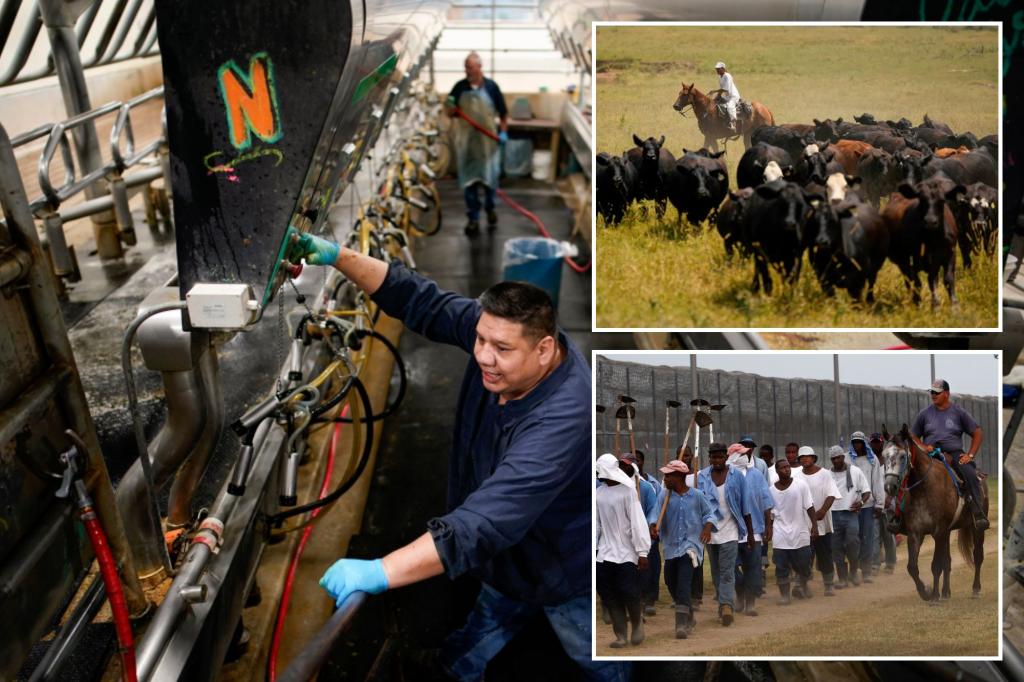In an exhaustive two-year investigation, The Associated Press found items linked to US prisoners ended up in the supply chain of a variety of products from Frosted Flakes cereal and Ball Park hot dogs to Gold Medal flour and Coca-Cola. It is on the shelves of most supermarkets, including Kroger, Target, Aldi and Whole Foods.
Here is the AP investigation:
People of color are disproportionately affected
The US has a history of locking up more people than any other country – currently around 2 million – and the goods tied to prison labor have morphed into a huge multi-billion dollar empire, far beyond the classic image of people stamping license plates or working on road crews.
The prisoners who help produce these goods are disproportionately people of color. Some were sentenced to hard labor and forced to work – or face punishment – and sometimes paid pennies an hour or nothing at all. They are often excluded from the protections guaranteed to almost all other full-time workers, even when they are seriously injured or killed on the job. And it is almost impossible for them to prosecute.
And it was all legal, largely derived from the demands of labor as the South struggled to rebuild its shattered economy after the Civil War. In 1865, the 13th Amendment to the US Constitution outlawed slavery and forced labor—except as punishment for crimes. That clause is being challenged at the federal level, and efforts to remove similar language from state constitutions are expected to reach ballots in about a dozen states this year.
Inmate Sylvester Hameline works on milking equipment in the dairy at the Montana State Prison on Wednesday, Aug. 16, 2023, in Deer Lodge, Mont. AP
Various businesses benefit from prison labor
The AP obtained information from all 50 states through public records requests and inquiries to corrections departments, linking hundreds of millions of dollars in transactions to agriculture-based prison labor in state and federal facilities over the past six years. The figures include everything from people hired to work in private businesses to agricultural and livestock goods sold on the open market. Most of these items come from large operations in the South, although almost every state has some type of agricultural program.
Journalists also found prison labor in the supply chains of giants like McDonald’s, Walmart and Costco – and in the supply chains of goods shipped around the world through multinational companies, including to countries that Washington has imposed import bans on in recent years for using prisons and labor force yourself.
Inmate Matthew Boivin moves cattle on horseback while working at the Arkansas Department of Corrections Cummins Unit, Friday, Aug. 18, 2023, in Gould, Ark. AP
Different types of jobs
Almost all state and federal adult prisons in the country have some work program, employing about 800,000 people, according to a 2022 report by the American Civil Liberties Union. Most of the jobs are tied to tasks such as maintaining the prison, laundry or kitchen work. Some inmates also work for the state and municipalities, doing everything from cleaning up after hurricanes and tornadoes to picking up trash along busy highways.
But they are also contracted to private companies either directly from their prisons or through work release programs. They are often hired in industries with severe labor shortages, doing some of the dirtiest and most dangerous jobs in the country such as working in chicken factories, meat processing plants and sawmills.
AP found that prisoners who only had a few months or years left to serve their sentences worked in private companies across the country. Unlike work crews picking up trash in orange jumpsuits, they often go unnoticed, often wearing the same uniform as their civilian counterparts.
Incarcerated people have also been contracted to companies that work with prisons. In Idaho, they have sorted and packaged the state’s famous potatoes, which are exported and sold to companies across the country. In Kansas, they have worked at Russell Stover chocolate and Cal-Maine Foods, the largest egg producer in the country. Although the company has gone out of business, in recent years they have been hired in Arizona by Taylor Farms, which sells salad kits in many major grocery stores across the country and supplies popular fast food chains and restaurants such as Chipotle Mexican Grill.
In this Aug. 18, 2011 photo, a prison guard rides a horse with inmates as they return from farm work at the Louisiana State Penitentiary in Angola, La. AP
What does the company say?
While prison labor seeps into some companies’ supply chains through third-party suppliers without their knowledge, others buy directly. Giant commodity traders essential to feeding the world such as Cargill, Bunge, Louis Dreyfus, Archer Daniels Midland and Consolidated Grain and Barge have scooped millions of dollars worth of soy, corn and wheat straight from prison farms.
AP reached out for comment to companies identified as having ties to prison labor, but most did not respond.
Cargill acknowledged buying goods from prison farms in Tennessee, Arkansas and Ohio, saying it was only a fraction of the company’s total. It added that “we are currently in the process of determining appropriate remedial actions.”
McDonald’s said it would investigate any links to such labor, and Archer Daniels Midland and General Mills, which produces Gold Medal flour, pointed to their policies barring suppliers from using forced labor. Whole Foods responded firmly: “Whole Foods Market does not allow the use of prison labor in the products sold in our stores.”
Bunge confirmed it had bought grain from the corrections department but said it is selling the facilities it acquired from them in 2021, so they are “no longer part of Bunge’s footprint.”
Start your day with everything you need to know
Morning Report delivers the latest news, videos, photos and more.
Thank you for signing up!
What does prison say?
Corrections officials and other advocates note that not all work is forced and that prison work saves taxpayers money. They also say that workers are learning skills they can use when they are released and given a purpose, which can help deter reoffending. In some cases, labor can mean time is shaved from a sentence. And jobs provide a way to repay the debt to society, they say.
“A lot of these guys come from homes where they never understood work and they never understood the feeling at the end of the day for a job well done,” said David Farabough, who oversees the Arkansas prison farm.
While most critics do not believe all jobs should be eliminated, they say incarcerated people should be paid fairly, treated humanely and all work should be voluntary.
“They are largely uncompensated, they are forced to work, and it is not safe. They also don’t learn skills that will help them when they are released,” said law professor Andrea Armstrong, an expert on prison labor at Loyola University New Orleans.
Categories: Trending
Source: thtrangdai.edu.vn/en/




